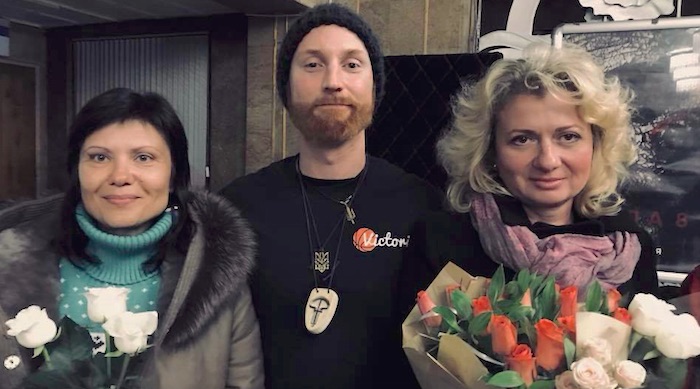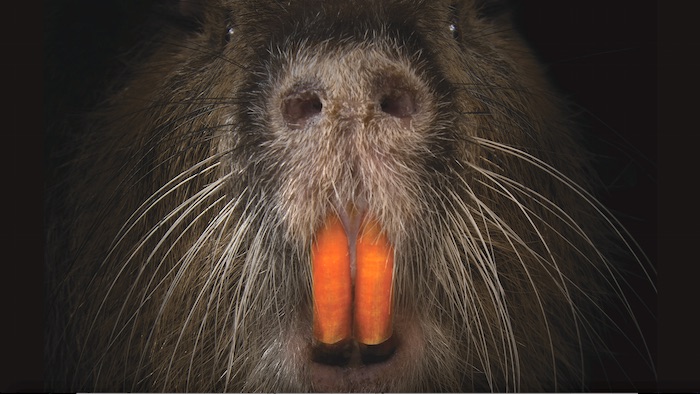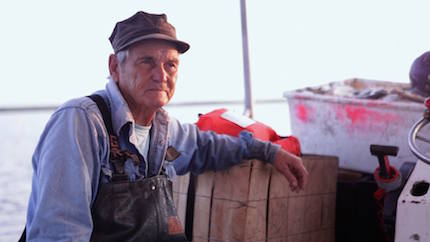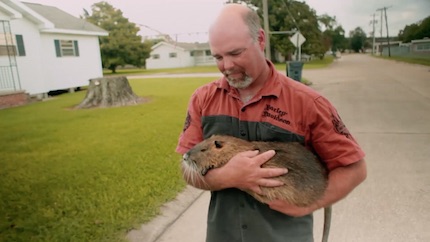MELBOURNE DOC FEST HONOUREES CAPTURE THE HUMAN EXPERIENCE
 Monday, July 16, 2018 at 7:47AM
Monday, July 16, 2018 at 7:47AM Wrapping its nine-day celebration of factual film last night, the Melbourne Documentary Film Festival announced works that run the gamut from tragic loss to inspirational triumph amongst the winners of its 2018 award roster.

Director Stefan Bugryn’s short film War Mothers (Матері Війні), a harrowing account of how three women have dealt with the deaths of their sons in the Ukrainian warzone, was afforded the prestigious Special Jury Prize. Burgryn (pictured, above; with war mothers Svetlana and Galina) embedded himself with the grieving mothers in high-conflict combat zones along the Eastern Front, crafting a deeply empathetic account of loss and sorrow; that dedication to truth and his craft also earned the young Melbourne-based filmmaker the Best Director (Short Film) trophy.
 The Best International Short Award was bestowed upon Ex Nihilo (pictured, right), director Timo Wright’s multi-national co-production that examines via a non-linear, three-tiered narrative scientific advancements in the fields of cryonics, robotics and our own mortality. The Best Australian Short Award went to Wolfe, director Claire Randall’s examination into the psychology of a young man whose imaginary friend revealed deep secrets about his existence. A graduate of Queensland’s Griffith University, Randall has found universal acclaim for her remarkably assured debut, having already secured a Crystal Bear trophy at the Berlinale earlier this year.
The Best International Short Award was bestowed upon Ex Nihilo (pictured, right), director Timo Wright’s multi-national co-production that examines via a non-linear, three-tiered narrative scientific advancements in the fields of cryonics, robotics and our own mortality. The Best Australian Short Award went to Wolfe, director Claire Randall’s examination into the psychology of a young man whose imaginary friend revealed deep secrets about his existence. A graduate of Queensland’s Griffith University, Randall has found universal acclaim for her remarkably assured debut, having already secured a Crystal Bear trophy at the Berlinale earlier this year.
The Supreme Jury Prize for Feature Documentary went to Jack Yabsley’s Kings of Baxter, a rousing account of two Shakespearean-trained actors who set out to create a version of Macbeth using teenage detainees being held at the Frank Baxter Juvenile Justice Centre near Gosford on the New South Wales central coast. The director also secured the Best Director gong for his work, made in conjunction with the revered Bell Shakespeare Company and his production company shingle, Grumpy Sailor.
The Best International Documentary prize was awarded to Susanna Styron’s Out of My Head, an in-depth study of the truths, lies and latest revelations about migraine headaches. Afforded a personal perspective via the struggle faced by her daughter and featuring interviews with high-profile migraine sufferers such as writer Joan Didion, Styron’s documentary presents a modern medical emergency that science is only now beginning to comprehend.
 The recent Australian theatrical release Kangaroo, from husband-&-wife co-directors Michael Mcintyre and Kate McIntyre-Clere, earned the Best Australian Documentary nod. The controversial examination of the nation’s love/hate/abusive relationship with the beloved marsupial has itself experienced polar opposite responses from for-and-against advocates for its often shocking exposé approach. The hometown award for Best Melbourne Documentary went to Fish Out of Water (pictured, right), filmmaker Israel Cannan’s profile of two upwardly mobile types who forego their career paths to row a wooden boat the length of the North Atlantic Ocean.
The recent Australian theatrical release Kangaroo, from husband-&-wife co-directors Michael Mcintyre and Kate McIntyre-Clere, earned the Best Australian Documentary nod. The controversial examination of the nation’s love/hate/abusive relationship with the beloved marsupial has itself experienced polar opposite responses from for-and-against advocates for its often shocking exposé approach. The hometown award for Best Melbourne Documentary went to Fish Out of Water (pictured, right), filmmaker Israel Cannan’s profile of two upwardly mobile types who forego their career paths to row a wooden boat the length of the North Atlantic Ocean.
 Documentary,
Documentary,  Film Festival,
Film Festival,  MDFF,
MDFF,  Melbourne
Melbourne 



